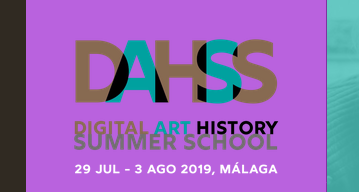
Málaga (Spain), July 29 – August 3, 2019
Deadline: May 28, 2019
IV Edition: Digital Art History Summer School: Data-Driven Analysis and Digital Narratives
We are pleased to announce that the International Summer School on Digital Art History (DAHSS), a joint initiative of the University of Málaga and the University of Berkeley, with the collaboration of the Ludwig Maximilian Universität of Munich, will celebrate the fourth edition from July 29 to August 3 (2019) in Málaga (Spain).
The application period is now open (until May 28). Please, visit: http://historiadelartemalaga.uma.es/dahss19/en/applications/
Under the title of Data-Driven Analysis and Digital Narratives, DAHSS pursues two objectives:
a) to configure an interdisciplinary framework to expand the IT skills of students, scholars and professionals dealing with the production, representation and communication of knowledge in the fields of Art History, Visual Culture and Cultural Heritage;
b) to build a environment where creative, innovative and collaborative research practices are encouraged and promoted.
The course has a theoretical-practical orientation: theoretical exchange and critical discussions will be combined with practical sessions (lab-based sessions) through which participants will work collaboratively in common projects. The results of these projects will be publicly presented the last day of the course.
The course is organized around three tracks.
Track A: Data and the Arts: In Track A, lead by Greg Niemeyer (UC Berkeley), you will explore what role data can play in the arts from the ancient Nilometer to current circulation data and machine vision but also addressing artwork that deals explicitly with the cultural deficit around data and machine learning. You will learn how to collect data with sensors, how to manipulate that data, and how to present it in interactive ways online. No coding experience required, we will teach and use javascript and p5.js for our weeklong projects, and you will go home with a completed project online.
Track B: Experience in data analysis is essential for a data-oriented Art History. Data analysis and visualization also serves to publish research to broad audiences and to engage the public with museums’ collections. In this track, led by Harald Klinke (LMU Munich), we will look into open data sources, learn the fundamentals of data analysis in R and go into practice by preparing data and images for a working twitter bot. No prior knowledge is necessary. Please, bring your own laptop.
Track C: 3D Modeling. This track, lead by Justin Underhill (UCB), will explore interactive media using the Unity game engine. We will experiment with different ways of exploring virtual space, and will see how we might use augmented and virtual reality to practice Digital Art History. We will also ask ourselves how to best design visualizations and historical reconstructions for these environments.
Intended audience: postgraduate students, academic researchers, independent scholars and professionals related to the following disciplines: Art History and Visual Studies, Fine Arts, Graphic Design, Computer Sciences, Media and New Media Studies and Museum Studies.
In addition, the program will include:
a) a specific session to discuss the challenges posed by the publication in the field of Digital Art History, especially in relation to data-oriented projects.
b) a presentation and practice session with Pathfinder, a specific platform for data analysis and visualizations on art catalogs and exhibitions (http://pathfinder-art.es).
For more information, please visit: http://historiadelartemalaga.uma.es/dahss19/en/
You must be logged in to post a comment.